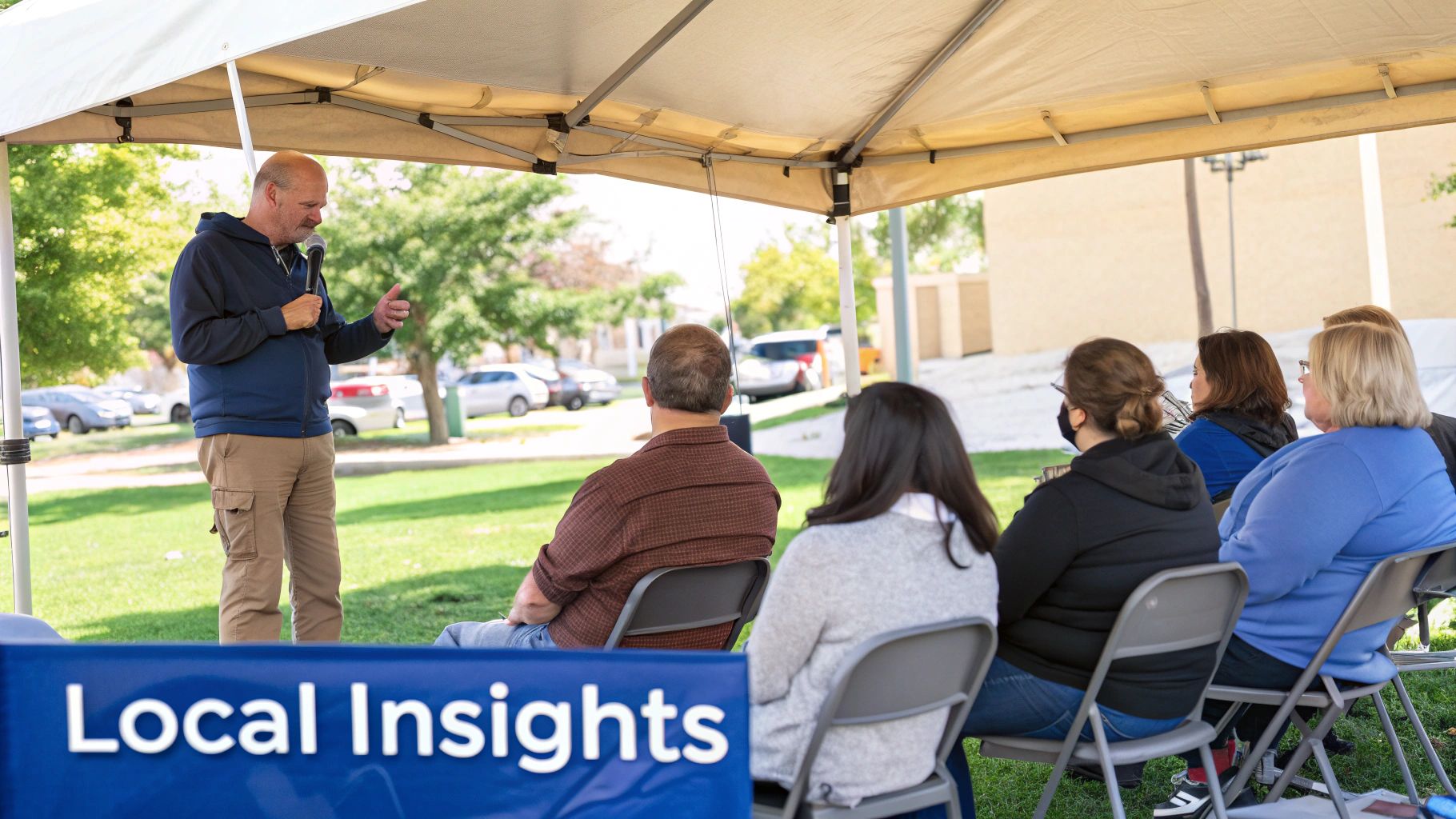In the competitive commercial insurance landscape, relying on outdated lead generation tactics is no longer a viable strategy. Decision-makers, from risk managers to underwriters, demand targeted, value-driven engagement. This article moves beyond generic advice to provide a strategic playbook of high-impact strategies tailored for today's market. We offer a clear roadmap for modern lead generation for insurance agents focused on building a predictable, high-quality pipeline.
This guide presents seven proven methods designed for immediate implementation by commercial insurance brokers, underwriters, and risk managers. You will learn how to build powerful referral networks, create educational content that attracts ideal commercial clients, and leverage strategic partnerships for consistent growth. We will also dissect sophisticated digital campaigns, local community outreach, and effective email nurturing sequences. Each section provides actionable frameworks to help you attract, engage, and convert high-value commercial clients. Forget cold calls; it's time to adopt a proactive, multi-channel approach that delivers measurable results and solidifies your position as a trusted industry authority.
1. Referral Marketing and Client Advocacy Programs
Harnessing your existing client base is one of the most effective strategies for lead generation for insurance agents. A structured referral marketing program transforms satisfied policyholders into a proactive, trust-based sales force. This approach moves beyond passively hoping for word-of-mouth recommendations and implements a systematic process to incentivize and track client advocacy, resulting in high-quality, warm leads that are more likely to convert.

Referral Marketing and Client Advocacy Programs
This method's power lies in leveraging established trust. A recommendation from a colleague or a business in a related industry carries significantly more weight than a digital advertisement, immediately overcoming initial skepticism and shortening the sales cycle for complex commercial policies.
Why It Works for Insurance Agents
In an industry built on trust and relationships, a professional referral is the ultimate social proof. When an existing client recommends your services, they are vouching for your expertise, reliability, and customer service. This is particularly crucial for commercial insurance providers, where the stakes are high and the decision-making process is complex. A referral from a trusted peer can open doors to risk managers and C-suite executives that would otherwise remain closed.
Key Insight: A successful referral program is not just about rewards; it's about making it effortless for satisfied clients to share their positive experiences. The easier you make it to refer, the more referrals you will receive.
How to Implement a Referral Program
To build a high-impact referral system, focus on structure, simplicity, and valuable incentives relevant to your commercial clientele.
- Define Clear Incentives: Offer tangible rewards that motivate clients. While some carriers use account credits, commercial brokers might find success with premium discounts, charitable donations in the client's name, or access to exclusive risk management content.
- Automate the Process: Utilize B2B-focused CRM features or dedicated platforms to automate referral requests, track incoming leads, and manage reward fulfillment. This ensures no opportunity is missed in a high-volume environment.
- Time Your 'Ask' Strategically: The best time to request a referral is immediately following a positive interaction, such as after a smooth claims process, a policy review that optimized coverage, or a successful annual renewal.
- Ensure Rapid Follow-Up: A referred lead's interest is highest at the point of introduction. Contact every new referral within 24 hours to capitalize on the warm introduction and make a strong first impression.
2. Content Marketing and Educational Blogging
Creating high-value, educational content is a cornerstone strategy for modern lead generation for insurance agents. This approach focuses on attracting commercial clients by answering their most pressing questions and addressing specific industry risks through blog posts, whitepapers, and webinars. Instead of direct sales pitches, you position your agency as a trusted, authoritative advisor, generating organic traffic and inbound leads from businesses actively seeking risk management information.

Content Marketing and Educational Blogging
The power of this method lies in building trust before a sales conversation ever begins. By providing helpful, no-strings-attached analysis of emerging risks like climate change or cyber threats, you establish credibility and become the go-to resource when a prospect is ready to review their policy.
Why It Works for Insurance Agents
In a complex industry, educational content demystifies insurance products and risk management processes. For commercial insurance brokers, creating detailed guides on industry-specific risks (e.g., "Supply Chain Resilience for Manufacturers") or regulatory compliance can attract high-value B2B clients looking for specialized expertise. This inbound marketing approach for insurance lead generation ensures a steady stream of qualified prospects.
<iframe width="560" height="315" src="https://www.youtube.com/embed/P73PQTofaik" frameborder="0" allow="accelerometer; autoplay; clipboard-write; encrypted-media; gyroscope; picture-in-picture" allowfullscreen></iframe>
Key Insight: Risk managers don't search for brokers; they search for solutions to their problems. Your content must provide those solutions first, positioning your agency as the logical partner.
How to Implement a Content Marketing Strategy
To build an effective content engine, focus on relevance, consistency, and clear calls-to-action tailored to a professional audience.
- Target 'Pain Point' Keywords: Create content around business triggers, such as "how to lower workers' comp premiums" or "commercial property insurance after a flood." Focus on long-tail keywords like "cyber liability insurance for healthcare providers" to attract highly motivated searchers.
- Focus on Local SEO and Industry Verticals: Develop localized content, such as "A Guide to Commercial Property Insurance in Miami," or industry-specific pieces like "Navigating Product Liability for SaaS Companies" to capture relevant search traffic.
- Repurpose Content for Maximum Reach: Turn a comprehensive whitepaper into a webinar, an infographic for LinkedIn, and key points for an executive email briefing. This maximizes the return on your initial content creation effort.
- Include a Clear Call-to-Action (CTA): Every piece of content should guide the reader on what to do next. End each article with a CTA like "Contact us for a personalized risk assessment" or "Download our free commercial insurance checklist."
3. Social Media Lead Generation and Community Building
Leveraging social media is a powerful, proactive strategy for lead generation for insurance agents in the commercial space. This approach is centered on building a professional presence on platforms like LinkedIn, sharing valuable risk management insights, and fostering a community of industry peers. By engaging authentically, agents can build trust and brand recognition, transforming these platforms into consistent lead funnels.

Social Media Lead Generation and Community Building
This method's effectiveness stems from its ability to meet commercial decision-makers where they are already active. Instead of interrupting their day with cold outreach, you become a trusted resource they actively follow for industry intelligence, making them significantly more receptive when a need for your services arises.
Why It Works for Insurance Agents
Social media allows agents to demonstrate expertise and build relationships at scale. For commercial insurance brokers, LinkedIn is an invaluable tool for identifying risk managers, underwriters, and CFOs. Sharing insights on emerging risks, market trends, or recent regulatory changes establishes you as a thought leader and the go-to expert in your niche.
Key Insight: The goal on social media is not to sell directly in every post, but to build credibility through consistent value. When a follower needs to review their commercial policy, the broker who has already provided them with helpful content will be their first call.
How to Implement a Social Media Strategy
A successful social media plan requires focus, consistency, and a genuine desire to help your professional audience navigate risk.
- Choose Platforms Wisely: Focus on LinkedIn for B2B and commercial lines. This is the primary platform for engaging with risk managers, C-suite executives, and other professional decision-makers.
- Provide Actionable Value: Share content that solves business problems. Create posts about common coverage gaps in commercial policies, tips for navigating complex claims, or analyses of recent court rulings affecting liability. Client case studies are also highly effective.
- Utilize Targeted Advertising: Use LinkedIn's advanced targeting to reach decision-makers by job title, industry, company size, and geographic location. Promote whitepapers or webinars to generate high-quality leads.
- Engage Authentically: Actively participate in relevant industry groups and conversations. Answer questions without a hard sales pitch. The more value you provide, the more you will establish your credibility and attract inbound inquiries.
4. Strategic Partnerships and Professional Networking
Building a robust network of complementary professionals is a cornerstone of sustainable lead generation for insurance agents. This strategy involves creating mutually beneficial relationships with experts like commercial real estate agents, business attorneys, financial advisors, and CPAs who serve a similar client base. This creates a powerful, symbiotic ecosystem where you receive a steady stream of highly qualified, warm referrals.

Strategic Partnerships and Professional Networking
This approach thrives on professional trust and shared value. When a business attorney recommends a broker for D&O insurance or a CPA collaborates on a comprehensive risk management plan, the referral carries inherent credibility. The client trusts their primary advisor's judgment, making them highly receptive to your services.
Why It Works for Insurance Agents
Professional networking creates a lead generation channel based on expertise and relevance. Your partners are not just sending leads; they are identifying specific business needs you can solve. For a commercial insurance broker, a referral from a business attorney working with a new startup is invaluable. It positions you as a pre-vetted solution at the exact moment the client requires your services, dramatically increasing conversion rates.
Key Insight: The most successful professional partnerships are built on a "give-to-get" philosophy. Focus on providing value to your partners and their clients first, and the referrals will follow as a natural outcome of that established trust.
How to Implement a Professional Networking Strategy
A structured approach to networking transforms casual connections into a reliable lead pipeline. For more insights, you can explore BPC's detailed guide on sales prospecting best practices.
- Identify High-Potential Partners: Target professionals whose clients have an immediate or recurring need for commercial insurance. Think business attorneys, CPAs, commercial real estate brokers, and M&A advisors.
- Provide Reciprocal Value: Offer to co-host webinars on topics like "Risk Management for Tech Startups," create shared educational content, or provide complimentary insurance reviews for your partner's top clients. Become their go-to resource for all things insurance.
- Formalize the Relationship: Create simple partnership agreements that outline the referral process, communication expectations, and any commission or referral fee structures to ensure clarity and commitment.
- Engage in Industry Events: Actively participate in local chamber of commerce meetings, industry-specific trade association events, and professional networking groups to build high-quality, in-person relationships.
5. Digital Advertising and Pay-Per-Click (PPC) Campaigns
For insurance agents seeking immediate visibility and a scalable source of prospects, digital advertising is an indispensable tool. A well-executed Pay-Per-Click (PPC) campaign on platforms like Google Ads or LinkedIn Ads places your agency directly in front of commercial clients at the exact moment they are searching for specific insurance products. This strategy bypasses the longer timelines of organic growth, delivering targeted traffic and a measurable return on investment.
The core principle is precision. You can target users based on job title, industry, company size, and specific search queries like "commercial liability insurance quotes" or "cyber insurance for small business." This makes it a powerful component of any modern strategy for lead generation for insurance agents.
Why It Works for Insurance Agents
Digital advertising allows agents to compete for attention in a crowded marketplace by targeting high-intent businesses. Unlike traditional outreach, PPC connects you with prospects who have already identified a need and are actively seeking a solution. For instance, a LinkedIn campaign can target risk managers at manufacturing firms, while a Google Ads campaign can capture users searching for specific policy types, ensuring your marketing budget is spent efficiently.
Key Insight: The success of PPC is not just about driving clicks; it's about driving the *right* clicks. Effective campaigns focus on attracting qualified prospects by using precise targeting, compelling ad copy, and high-converting landing pages.
How to Implement a PPC Campaign
A strategic approach is crucial for maximizing your return on ad spend and generating quality leads in the commercial space.
- Target Long-Tail Keywords: Instead of broad terms like "business insurance," focus on specific phrases like "contractor liability insurance in Austin" or "E&O insurance for architects." This reduces competition and cost-per-click while attracting more qualified leads.
- Create Dedicated Landing Pages: Directing ad traffic to a generic homepage is a common mistake. Create specific, high-converting landing pages for each campaign that mirror the ad's message and have a clear call-to-action, such as "Request a Consultation." When designing your campaigns, reviewing examples of the best Google Ads landing pages for lead generation can inspire your own high-converting designs.
- Use Negative Keywords: Actively build a list of negative keywords (e.g., "cheap," "jobs," "free," "personal") to prevent your ads from showing to irrelevant searchers, which saves your budget for qualified prospects.
- Implement Conversion Tracking: From day one, set up conversion tracking to measure which keywords, ads, and campaigns are generating actual leads (form submissions, calls). This data is essential for optimizing performance and proving ROI.
6. Local Community Events and Educational Seminars
Engaging your local business community through events and educational seminars is a powerful, high-touch strategy for lead generation for insurance agents. This approach positions you as a trusted local expert and risk management advisor. By providing genuine value and education on topics like workplace safety or business continuity planning, you can build meaningful relationships and attract qualified commercial prospects.
This method thrives on face-to-face interaction, which builds trust and rapport far more effectively than digital channels alone. Organizing or participating in local business events allows you to connect directly with your target audience, understand their specific operational challenges, and demonstrate your expertise in an informative, non-promotional setting.
Why It Works for Insurance Agents
Commercial insurance is a complex product that requires education for the client to appreciate its value fully. Seminars provide the perfect platform to break down intricate topics like D&O liability, cyber risk, or navigating workers' compensation. This educational approach builds credibility and establishes you as the go-to authority in your community, making local businesses more likely to turn to you when they are ready to review their coverage.
Key Insight: The goal of community events is not to sell but to educate and build relationships. When you focus on providing value upfront, lead generation becomes a natural byproduct of the trust you have established.
How to Implement a Community Engagement Strategy
To turn community presence into a consistent lead pipeline, focus on valuable content, strategic partnerships, and diligent follow-up.
- Host Targeted Educational Workshops: Organize seminars on topics relevant to your ideal commercial clients, such as a "Cybersecurity for Small Businesses" workshop for local chamber of commerce members. A well-run seminar can generate numerous qualified leads.
- Partner with Local Influencers: Collaborate with business banks, CPAs, or industry associations to co-host events. This expands your reach and provides a warm introduction to their established networks of business owners.
- Offer Value for Contact Information: Instead of a simple sign-up sheet, offer a valuable resource like a comprehensive risk assessment checklist, a free one-on-one consultation, or a copy of the presentation slides in exchange for contact details.
- Follow Up Promptly and Personally: Contact every attendee within 48 hours. Reference a specific point from the event or a question they asked to personalize your outreach and demonstrate your attentiveness. Learn more about effective local community engagement strategies for insurance agents to refine your approach.
7. Email Marketing and Lead Nurturing Campaigns
A systematic email marketing strategy is a cornerstone of modern lead generation for insurance agents targeting commercial clients. This approach uses automated nurturing campaigns to guide prospects through the complex insurance buying journey. By delivering valuable content at the right time, agents can build trust, educate potential clients on relevant risks, and stay top-of-mind, converting cold leads into warm opportunities over time.
This method's effectiveness comes from its ability to scale personalized communication. Automated sequences can engage thousands of prospects with messaging tailored to their specific industry and stage in the decision-making process, ensuring no potential client falls through the cracks.
Why It Works for Insurance Agents
Commercial insurance is a high-consideration purchase. Prospects often require extensive education and multiple touchpoints before making a decision. Email nurturing provides a consistent, low-pressure channel to deliver this education, positioning you as a trusted advisor. This is especially vital for commercial insurance, where buying cycles are long and the need for expert guidance on issues like climate risk or regulatory changes is high.
Key Insight: The goal of lead nurturing isn't immediate sales; it's to build a relationship and provide value, so when a prospect is ready to buy, you are their first and only choice.
How to Implement a Nurturing Campaign
To develop an effective email nurturing system, focus on segmentation, value, and automation.
- Segment Your Audience: Group contacts by specific criteria like industry (e.g., manufacturing, tech), role (e.g., CFO, risk manager), or expressed interest (e.g., downloaded a guide on cyber insurance). This allows for highly relevant messaging.
- Create Value-Driven Sequences: Develop automated email series that address common pain points. A campaign for construction company owners could educate them on builders' risk, surety bonds, and workers' compensation over several weeks.
- Automate for Efficiency: Use a CRM with marketing automation capabilities to trigger campaigns based on user actions like downloading a whitepaper or visiting a specific page on your website.
- Focus on a Single CTA: Each email should have one clear call-to-action (CTA), whether it's "Read Our Analysis of Recent Market Trends" or "Schedule a 15-Minute Risk Assessment." To discover more powerful strategies, learn more about our in-depth look at Email Marketing and Lead Nurturing Campaigns.
Lead Generation Strategies Comparison
| Strategy | Implementation Complexity 🔄 | Resource Requirements ⚡ | Expected Outcomes 📊 | Ideal Use Cases 💡 | Key Advantages ⭐ |
|---|---|---|---|---|---|
| Referral Marketing and Client Advocacy | Moderate to High 🔄🔄 | Moderate (client service & rewards) ⚡ | High conversion rates (15-30%), pre-qualified leads 📊 | Post-purchase, claim resolution, annual reviews 💡 | High ROI, stronger relationships, low acquisition cost ⭐ |
| Content Marketing and Educational Blogging | High 🔄🔄🔄 | Time-intensive, skilled content creation ⚡ | Long-term organic traffic growth, trust building 📊 | Brand building, inbound lead generation 💡 | Builds expertise, scalable, low cost ⭐ |
| Social Media Lead Generation and Community Building | High 🔄🔄🔄 | Daily engagement, ad spend recommended ⚡ | Moderate direct leads, brand growth, real-time engagement 📊 | Younger demographics, brand presence, community growth 💡 | Targeted ads, personal brand building, cost-effective ⭐ |
| Strategic Partnerships and Professional Networking | Moderate 🔄🔄 | Time and relationship management ⚡ | Steady flow of high-quality referrals 📊 | Cross-industry referrals, professional channels 💡 | Highly qualified leads, mutual benefits, credibility ⭐ |
| Digital Advertising and Pay-Per-Click (PPC) | High 🔄🔄🔄 | Budget-heavy ($1000–3000+/month) ⚡ | Immediate traffic and leads, measurable ROI 📊 | Fast lead capture, targeted campaigns 💡 | Immediate results, scalable, precise targeting ⭐ |
| Local Community Events and Educational Seminars | Moderate 🔄🔄 | Time and upfront costs ⚡ | Strong local reputation, multiple leads per event 📊 | Local presence, face-to-face relationship building 💡 | Builds trust locally, expert positioning ⭐ |
| Email Marketing and Lead Nurturing Campaigns | Moderate 🔄🔄 | Automation tools, content creation ⚡ | Ongoing lead nurturing, measurable engagement 📊 | Long-term prospect nurturing, client retention 💡 | Low cost, scalable, measurable, automation ⭐ |
From Strategy to Execution: Activating Your Lead Generation Engine
You now have a strategic roadmap featuring seven powerful, high-impact methods for generating leads. From fostering client advocacy through referral programs to building authority with educational content and engaging prospects through targeted digital advertising, these tactics form the pillars of a robust business development strategy. The core principle is clear: effective lead generation for insurance agents is not a passive activity but a dynamic, multi-channel system.
Success hinges on moving from understanding these concepts to disciplined execution. Merely knowing about strategic partnerships or email marketing is not enough; the value lies in implementing, testing, and refining these approaches to fit your unique market and clientele. Each strategy requires consistent effort to build momentum and deliver a predictable flow of qualified opportunities.
Key Takeaways for Immediate Action
To transform this knowledge into tangible results, focus on these critical next steps:
- Integrate, Don't Isolate: The most successful agents don't rely on a single lead source. They build an interconnected engine where different strategies support each other. For example, use content from your blog as the basis for your email nurturing campaigns and share it on social media to drive traffic and engagement.
- Prioritize with Precision: Not all leads are created equal. As you generate more interest, your ability to identify high-potential prospects becomes crucial. To effectively activate your lead generation engine and prioritize prospects, consider leveraging AI lead scoring playbooks to focus your resources on the opportunities most likely to convert.
- Embrace Proactive Outreach: The ultimate competitive advantage in the commercial insurance space is timing. While traditional methods are effective for building a pipeline, layering in real-time, high-intent data can revolutionize your approach. Identifying a business *at their moment of need*, such as immediately following a climate-related event, allows you to offer solutions when they are most receptive.
Mastering lead generation is the definitive factor that separates stagnant agencies from high-growth firms. By building a sustainable and diversified lead generation engine, you create a resilient business that can thrive in any market condition. It’s about more than just filling your pipeline; it's about establishing your firm as a trusted, proactive advisor that commercial clients turn to in their most critical moments. The future of insurance lead generation is here, and it belongs to those who are proactive, data-driven, and relentlessly focused on delivering value.
---
Ready to transform your lead generation with real-time, high-intent data? Discover how Insurtech.bpcorp.eu delivers validated commercial leads impacted by climate events directly to you. Visit Insurtech.bpcorp.eu to see how our disaster intelligence platform can give you an unparalleled competitive edge.